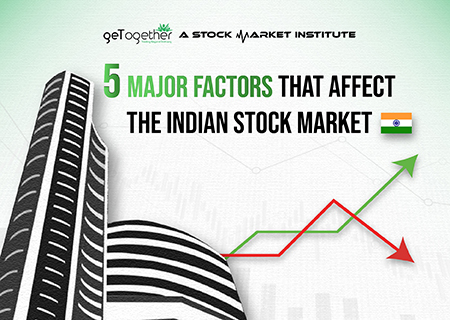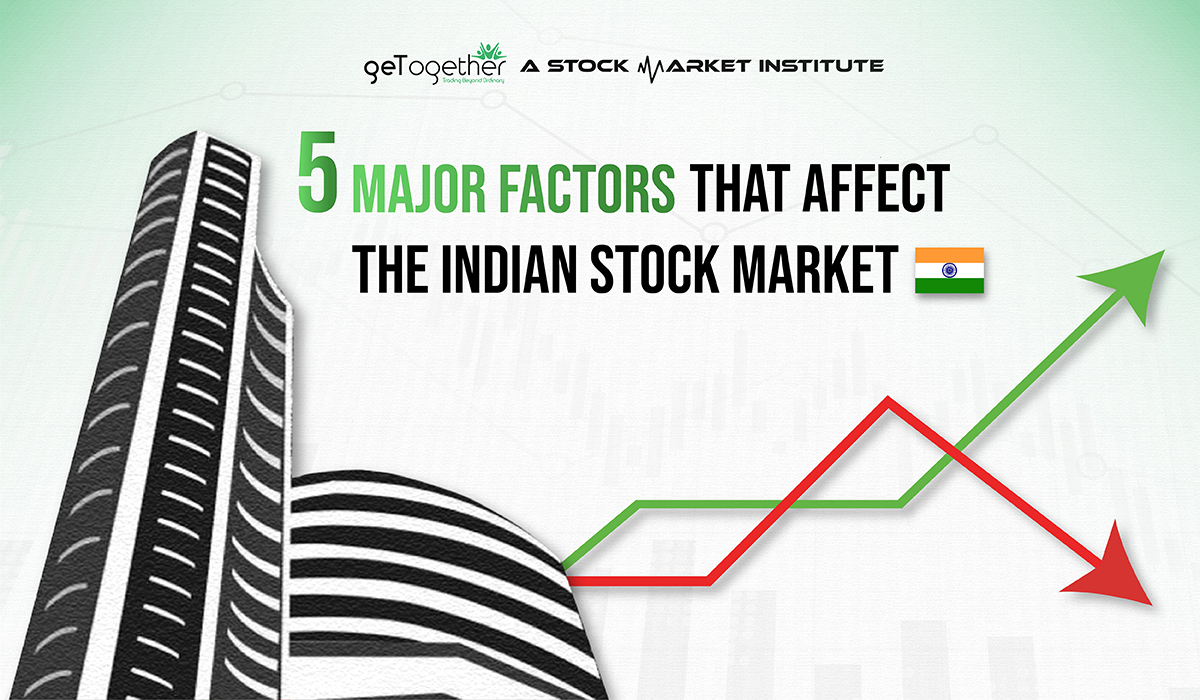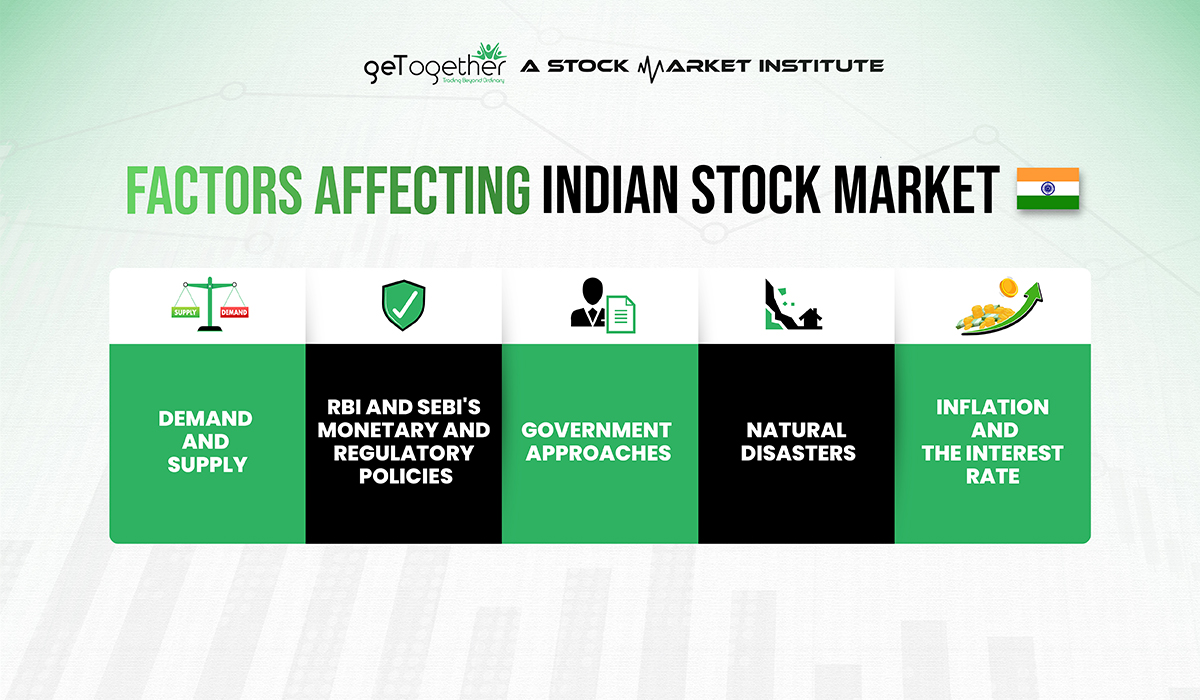5 Major Factors That Affect the Indian Stock Market


Overview of the Indian Stock Market
The Indian stock market is one of the world’s fastest expanding, with two major stock exchanges: the Bombay Stock Exchange (BSE) and the National Stock Exchange. The BSE, established in 1875, is Asia’s oldest stock exchange, whereas the NSE, founded in 1992, is noted for its pioneering digital technology.
The Indian stock market is distinguished by a broad range of listed companies, from huge corporations to young startups. Major indexes, such as the BSE Sensex and NSE Nifty 50, are tracked and used as key market performance indicators. Economic reforms, more foreign investment, and the rise of the middle class have all contributed to the market’s rapid expansion in recent years.
Despite the turmoil generated by the domestic and global markets, the Indian stock market remains a viable investment destination, providing prospects for economic progress in one of the world’s largest countries.
Investments are risky these days due to stock price volatility. Therefore, investors must gather information about the stock market prior to investing in any stock. We all understand that the stock market is made up of two types of people first, daring individuals and second risk-unwilling individuals. The individuals who are risk-takers move ahead and invest in the market despite the volatility but People, on the other hand, who are scared of taking risks are the ones who do not wish to enter the market.
About Indian Stock Market
The stock market is a platform where financial backers, brokers, and organisations can trade portions of public corporations. The stock market gives businesses access to capital and gives investors chances to invest in those businesses and possibly get potential returns on their money. The stock market is likewise a sign of the general well-being of the economy, as variances in the market can reflect changes in monetary circumstances and investor sentiments.
The two significant stock exchanges in India are the Bombay Stock Exchange (BSE) and the National Stock Exchange (NSE). While the NSE is India’s largest stock exchange in terms of market capitalization, the BSE is one of Asia’s oldest stock exchanges. The Indian stock market furnishes organizations with admission to capital and investors with chances to put resources into those organizations and possibly procure a profit from their investments. The Securities and Exchange Board of India (SEBI) is in charge of overseeing the market. The Indian stock market is an important indicator of the overall health of the Indian economy. This blog is going to give you a guide on 5 major factors that affect the Indian stock market.
FACTORS AFFECTING INDIAN STOCK MARKET

DEMAND AND SUPPLY
Price action in any market is largely determined by supply and demand. This refers to the amount of an offer or stock that purchasers are willing and ready to buy at a given cost. In contrast, supply is the number of shares or stocks that sellers are willing and able to offer for sale at a particular price.Besides, at a moment when demand for a stock is high and the supply is confined, costs will as a general rule rise. Conversely, prices tend to decrease when supply exceeds demand.
In any market, price determination is based on the interaction between demand and supply. For example, price shifts can result from shifts in demand or supply in the short term. Traders can gain a better understanding of the market’s supply and demand dynamics by examining price movements over time.
RBI AND SEBI’s MONETARY & REGULATORY POLICIES
The RBI is the national bank that keeps up with monetary strength in the country. At the point when the RBI lessens its approach rates (repo rate, invert repo rate, cash save proportion, legal liquidity proportion), it is known as an expansionary financial arrangement. Stock prices are affected by any change in the repo rate. As a result, commercial banks can also borrow money from the RBI at lower interest rates when the repo rate is reduced. But this decrease in the expense of obligations diminishes the expense of capital for the organization.
In the Indian stock market, a decrease in the discount rate indicates an increase in the stock’s value so stock indices eventually rise when the price of a stock goes up. Adding that the Indian stock market is also affected by SEBI policy and regulation changes.
GOVERNMENT APPROACHES
Government Strategies assume a vital part in the monetary improvement of a country. To keep up with the great monetary state of the country, the public authority continually executes new approaches and it’s possible that any alterations in government policy will either benefit the economy or tighten its grip. The future of any sector is decided by these policies. This implies that administration arrangements are straightforwardly connected to stock costs. For example, on the off chance that the public authority chooses to increment corporate duties, the business will be antagonistically impacted. Subsequently, the stock costs of the firm will also diminish so government strategies also play a major role in the Indian stock market
NATURAL DISASTERS
Natural disasters can radically influence the worth of stocks and can ruin the stock market too. Natural disasters and pandemics like floods, seismic tremors, Yellow Fever, Coronavirus, etc influence the organisation’s exhibition and the spending limit of a person. It hinders the expansion of the country’s economy and leads to the organisation’s fall bringing about a fall later in income.
INFLATION AND INTEREST RATES
Inflation suggests the rising in the expense of work and items all through some undefined time period. Stock markets will suffer if interest rates rise in collaboration with the rate of inflation. The increasing expense has an unfriendly effect on the benefit level of the recorded organizations. Hence, the company’s stock prices are affected by this. The stock market’s listed companies put off making investments, which has a negative effect on the country’s economic growth and companies’ stock typically suffers because no one wants to invest in them.
Also Read: Gross Domestic Product
CONCLUSION
There are a lot of factors that may affect the stock market but if your knowledge and research are top-notch you can overcome all the factors and maximize your earnings. The stock market can give you potential profits after you learn the navigation of the market. One of the best ways to achieve all of our desires and ensure our future is to invest in the stock market. However, it carries a certain risk but the risk of investing in the stock market can be reduced with solid knowledge of the investment policies and market.
In any case, keeping in mind the factors that influence the Indian stock market, the investors can take the right speculation choice. In spite of the aforementioned factors, the Indian stock market is also affected by the Union Budget, commodity prices—input costs, gold prices, and bonds. Therefore, investors ought to have a sound allocation strategy in order to achieve a win-win scenario. The risk of investing in the stock market can be reduced with solid knowledge of the investment policies and market.
CATEGORIES



 Facebook
Facebook  Instagram
Instagram  Youtube
Youtube 
